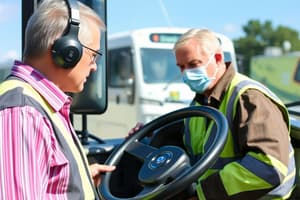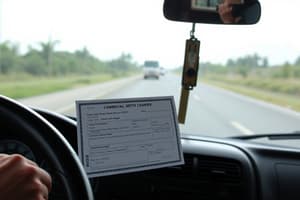Podcast
Questions and Answers
What is true about the front tires on a commercial bus?
What is true about the front tires on a commercial bus?
- They can be regrooved, but never recapped.
- They can be recapped, but never regrooved.
- They can be regrooved or recapped as long as they have 4/32 tread depth. (correct)
- They must not be recapped or regrooved.
What is a false statement about the bus interior?
What is a false statement about the bus interior?
- The seats must be safe for riders and securely fastened to the bus.
- Never drive with an open emergency exit door or window.
- You must always turn on the red emergency door light.
- If you use your outside lights, you don't need to turn on the red emergency door light. (correct)
What should you do with a disruptive passenger?
What should you do with a disruptive passenger?
- You must ensure the disruptive rider's safety as well as that of others.
- It may be safer to wait and discharge the disruptive passenger at the next scheduled stop. (correct)
- You must remove the disruptive passenger immediately.
- You should discharge such riders where it would be unsafe for them.
When should you lock some emergency roof hatches in a partly open position?
When should you lock some emergency roof hatches in a partly open position?
When do you not need to stop at a drawbridge?
When do you not need to stop at a drawbridge?
How far before a railroad crossing should you stop your bus?
How far before a railroad crossing should you stop your bus?
What is the purpose of the standee line on a bus?
What is the purpose of the standee line on a bus?
Which hazardous material is allowed to be carried on a bus?
Which hazardous material is allowed to be carried on a bus?
How many passengers, including the driver, must a bus be designed to seat for the driver to need a commercial driver license?
How many passengers, including the driver, must a bus be designed to seat for the driver to need a commercial driver license?
How far before a drawbridge must a bus driver stop if there is no traffic light or attendant?
How far before a drawbridge must a bus driver stop if there is no traffic light or attendant?
Which of the following statements is TRUE?
Which of the following statements is TRUE?
What should you do when you need to refuel the bus?
What should you do when you need to refuel the bus?
Flashcards are hidden until you start studying
Study Notes
Bus Safety Regulations
- A standee line is a 2-inch line on the floor that all passengers must stay behind.
- Buses are prohibited from carrying tear gas and poison gas, but small-arms ammunition is allowed.
- Bus drivers must have a commercial driver license (CDL) if they drive a vehicle designed to seat more than 16 or more persons, including the driver.
Hazardous Materials and Drawbridges
- Bus drivers must stop at least 50 feet before the draw of a bridge if there is no traffic light showing green or a traffic control attendant.
- If a drawbridge does not have a traffic light showing green or a traffic control attendant, bus drivers must slow down and make sure it's safe to proceed.
Safety Precautions
- Avoid fueling a bus with riders on board unless absolutely necessary, and never refuel in a closed building with riders on board.
- Do not transport intoxicated passengers, talk with riders or engage in any other distracting activity while driving, or tow or push a disabled bus with riders aboard either vehicle, unless getting off the bus would be unsafe.
- Never drive with an open emergency exit door or window, and ensure that all seats are securely fastened to the bus.
- If there is a red emergency door light, it must work.
Tire Safety
- The front tires on a commercial bus must not have recapped or regrooved tires.
Disruptive Passengers
- Ensure the disruptive rider's safety as well as that of others, and do not discharge them where it would be unsafe for them.
- It may be safer to wait and discharge the disruptive passenger at the next scheduled stop or a well-lighted area where there are other people.
Emergency Exits
- Lock some emergency roof hatches in a partly open position for fresh air.
Railroad Crossings
- Stop your bus 15 to 50 feet before a railroad crossing.
Brake and Accelerator Interlock System
- The interlock applies the brakes and holds the throttle in idle position when the rear door is open, and releases when you close the rear door.
- Do not use this safety feature in place of the parking brake.
Bus Interior Inspection
- Check each hand-hold and railing, signaling devices, including the restroom emergency buzzer (if the bus has a restroom), and emergency exit handles.
Commercial Driver License (CDL)
- Bus drivers must have a CDL if they drive a vehicle that has air brakes, is designed to seat more than 16 or more persons, including the driver, or has a gross weight rating of more than 26,000 pounds.
- Bus drivers must have a CDL if they drive a vehicle designed to carry more than nine passengers.
Carry-on Baggage
- Carry-on baggage cannot be stored in the aisles or block emergency exits.
Studying That Suits You
Use AI to generate personalized quizzes and flashcards to suit your learning preferences.




